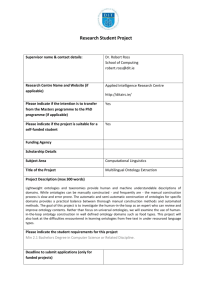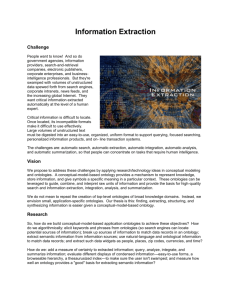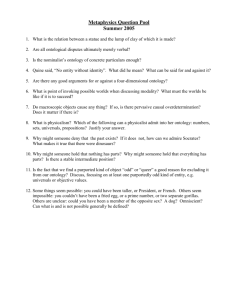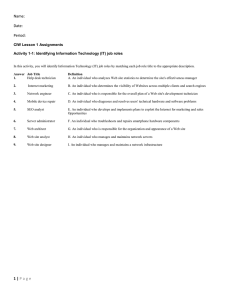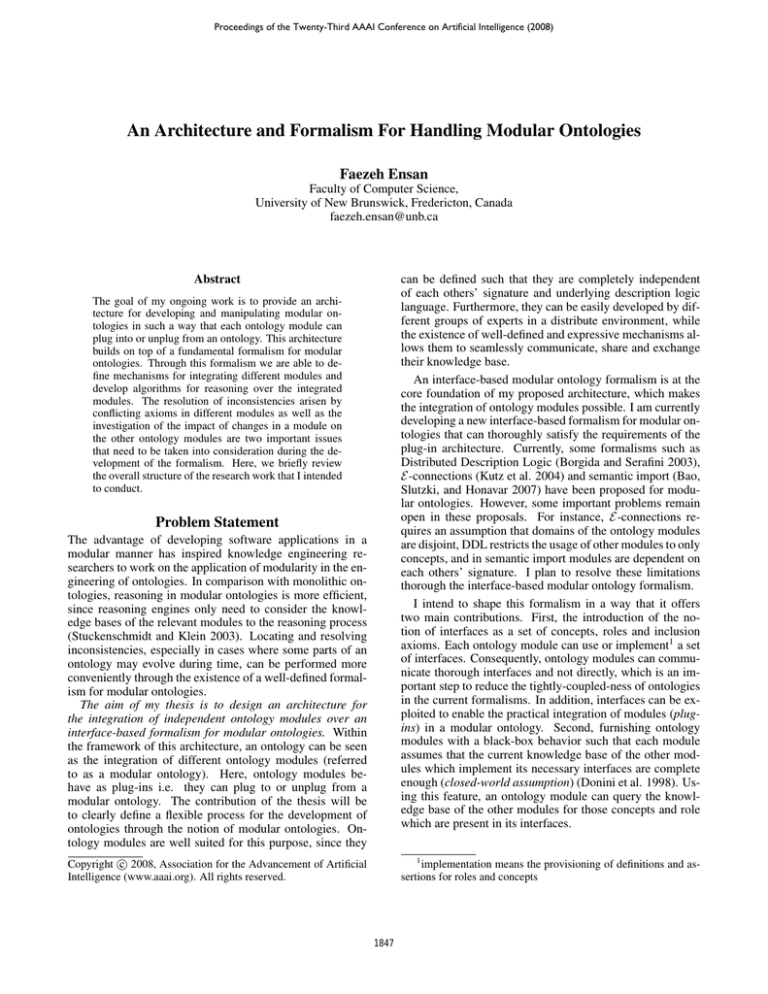
Proceedings of the Twenty-Third AAAI Conference on Artificial Intelligence (2008)
An Architecture and Formalism For Handling Modular Ontologies
Faezeh Ensan
Faculty of Computer Science,
University of New Brunswick, Fredericton, Canada
faezeh.ensan@unb.ca
Abstract
can be defined such that they are completely independent
of each others’ signature and underlying description logic
language. Furthermore, they can be easily developed by different groups of experts in a distribute environment, while
the existence of well-defined and expressive mechanisms allows them to seamlessly communicate, share and exchange
their knowledge base.
An interface-based modular ontology formalism is at the
core foundation of my proposed architecture, which makes
the integration of ontology modules possible. I am currently
developing a new interface-based formalism for modular ontologies that can thoroughly satisfy the requirements of the
plug-in architecture. Currently, some formalisms such as
Distributed Description Logic (Borgida and Serafini 2003),
E-connections (Kutz et al. 2004) and semantic import (Bao,
Slutzki, and Honavar 2007) have been proposed for modular ontologies. However, some important problems remain
open in these proposals. For instance, E-connections requires an assumption that domains of the ontology modules
are disjoint, DDL restricts the usage of other modules to only
concepts, and in semantic import modules are dependent on
each others’ signature. I plan to resolve these limitations
thorough the interface-based modular ontology formalism.
I intend to shape this formalism in a way that it offers
two main contributions. First, the introduction of the notion of interfaces as a set of concepts, roles and inclusion
axioms. Each ontology module can use or implement1 a set
of interfaces. Consequently, ontology modules can communicate thorough interfaces and not directly, which is an important step to reduce the tightly-coupled-ness of ontologies
in the current formalisms. In addition, interfaces can be exploited to enable the practical integration of modules (plugins) in a modular ontology. Second, furnishing ontology
modules with a black-box behavior such that each module
assumes that the current knowledge base of the other modules which implement its necessary interfaces are complete
enough (closed-world assumption) (Donini et al. 1998). Using this feature, an ontology module can query the knowledge base of the other modules for those concepts and role
which are present in its interfaces.
The goal of my ongoing work is to provide an architecture for developing and manipulating modular ontologies in such a way that each ontology module can
plug into or unplug from an ontology. This architecture
builds on top of a fundamental formalism for modular
ontologies. Through this formalism we are able to define mechanisms for integrating different modules and
develop algorithms for reasoning over the integrated
modules. The resolution of inconsistencies arisen by
conflicting axioms in different modules as well as the
investigation of the impact of changes in a module on
the other ontology modules are two important issues
that need to be taken into consideration during the development of the formalism. Here, we briefly review
the overall structure of the research work that I intended
to conduct.
Problem Statement
The advantage of developing software applications in a
modular manner has inspired knowledge engineering researchers to work on the application of modularity in the engineering of ontologies. In comparison with monolithic ontologies, reasoning in modular ontologies is more efficient,
since reasoning engines only need to consider the knowledge bases of the relevant modules to the reasoning process
(Stuckenschmidt and Klein 2003). Locating and resolving
inconsistencies, especially in cases where some parts of an
ontology may evolve during time, can be performed more
conveniently through the existence of a well-defined formalism for modular ontologies.
The aim of my thesis is to design an architecture for
the integration of independent ontology modules over an
interface-based formalism for modular ontologies. Within
the framework of this architecture, an ontology can be seen
as the integration of different ontology modules (referred
to as a modular ontology). Here, ontology modules behave as plug-ins i.e. they can plug to or unplug from a
modular ontology. The contribution of the thesis will be
to clearly define a flexible process for the development of
ontologies through the notion of modular ontologies. Ontology modules are well suited for this purpose, since they
1
implementation means the provisioning of definitions and assertions for roles and concepts
c 2008, Association for the Advancement of Artificial
Copyright Intelligence (www.aaai.org). All rights reserved.
1847
Research Status
In our prior work (Ensan and Du 2007), we have provided a
critical survey of the existing frameworks proposed for the
development and maintenance of ontologies. Furthermore in
(Ensan and Du 2008b), we have exploited the notion of goals
to form a methodology that assists experts in the process of
developing ontological frameworks.
The following is the list of the completed work (two first
items) and the future plans for my thesis:
(1) I have developed the formal basis for the interface-based
modular ontology formalism in (Ensan and Du 2008c).
I have shown that the satisfiability problem of a modular ontology developed using this formalism is decidable.
Furthermore, I have shown that the logical consequences
of the axioms presented in an interface will propagate
to all modules which use that specific interface. It has
been further shown that the employment of interfaces in
this formalism implies polymorphism in the sense that the
meaning of a concept or role in a module may be further specialized at configuration time through other realizer modules.
(2) I have studied the various sources of inconsistencies in
the proposed formalism and provided models to resolves
such cases in (Ensan and Du 2008a). Two sources may
lead a modular ontology to become inconsistent: First,
when there is an inconsistent module which affects the
consistency of the other modules in the modular ontology,
and Second, when each module is internally consistent but
their integration leads to inconsistencies. For the resolution of the first type of inconsistency, I have enhanced the
semantics of the proposed formalism such that it tolerates
the inconsistent module, and for the second problem, I
have presented an algorithm that resolves inconsistencies
by weakening the imported knowledge from the conflicting interfaces.
will probably introduce different layers, each of which is
responsible for performing different tasks. There should
obviously be a layer dedicated to ontology modules, and
also another that is responsible for manipulating plug-ins,
formalizing the affect of insertions to and removals from
any modules of the modular ontology and also performing
the consistency checking and change analysis algorithms.
(5) The last step in my thesis is to implement a software
which allows ontology users to design, develop and manipulate modular ontologies in the context of the proposed
architecture. The main contribution of such an integrated
development environment would be to allow the architecture, formalism, the reasoning and consistency checking
algorithms and the mechanism for change analysis to be
examined in real-world case studies. I expect that the obtained evaluation results may lead to the need for modifications in the proposed algorithms, especially some algorithms may need more efficient time complexity to be
suitable for real-world applications. For example, the current proposed inconsistency resolution algorithm, finds
the least number of conflicting interfaces, but it has a
rather high time complexity when the number of interfaces are high. I anticipate that this stage would provide
me with enough insight to be able to develop algorithms
whose time complexity are acceptable for real-world application.
References
Bao, J.; Slutzki, G.; and Honavar, V. 2007. A semantic
importing approach to knowledge reuse from multiple ontologies. In AAAI’07, 1304–1309.
Borgida, A., and Serafini, L. 2003. Distributed description logics: Assimilating information from peer sources. J.
Data Semantics 1:153–184.
Donini, F. M.; Lenzerini, M.; Nardi, D.; Nutt, W.; and
Schaerf, A. 1998. An epistemic operator for description
logics. Artif. Intell. 100(1-2):225–274.
Ensan, F., and Du, W. 2007. Towards domain-centric ontology development and maintenance frameworks. In Internation Conference on Software Engineering and Knowledge
Engineering (SEKE’07).
Ensan, F., and Du, W. 2008a. Aspects of inconsistency
resolving in modular ontologies. In Canadian Conference
on Artificial Intelligence.
Ensan, F., and Du, W. 2008b. Formalizing the role of goals
in the development of domain-specific ontological framew
orks. In Forty-First Hawai’i International Conference on
System Sciences (HICSS’08).
Ensan, F., and Du, W. 2008c. On the formalization of
interface-based modular ontologies under the closed-world
assumption. Technical report.
Kutz, O.; Lutz, C.; Wolter, F.; and Zakharyaschev, M.
2004. E-connections of abstract description systems. Artif.
Intell. 156(1):1–73.
Stuckenschmidt, H., and Klein, M. C. A. 2003. Integrity
and change in modular ontologies. In International Joint
Conference on Artificial Intelligence (IJCAI’03), 900–908.
(3) One of the major issues in the modular ontology formalism is to investigate how a single or set of changes in an
element of an ontology module can effect the other connected modules. This issue is important in modular ontologies, since a modification in a module which implements an interface may change the meaning of that interface for the user modules. Consequently, the semantics of some of the modules will be effected by any incoming change in the composite ontology modules. I am
planing to investigate this issue in the proposed interface
based formalism. I expect that I be able to derive some
initial ideas from the proposed solutions for existing formalisms such as those presented in (Stuckenschmidt and
Klein 2003) for DDL . However, the final approach will be
completely different due the different underlying expressiveness power of the formalisms as well as the closedworld assumption in the interface-based formalism. For
the algorithms that I may develop to handle changes, I
also intend to analyze their’s time complexity.
(4) Having the interface-based formalism as a foundation, the
next ongoing work will be to propose a plug-in architecture for creating modular ontologies. The architecture
1848

